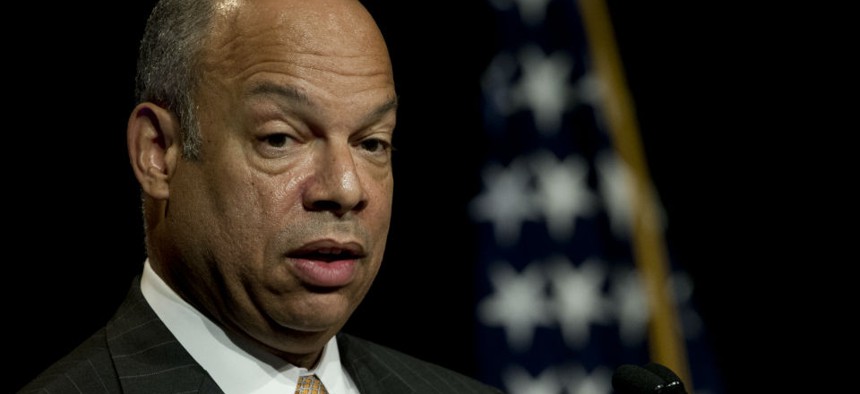
Homeland Security Secretary Jeh Johnson said Obama's order will help the department prioritize its mission. U.S. Navy Petty Officer 1st Class Chad J. McNeeley/Defense Department file photo
What the Obama Immigration Action Means for Federal Agencies
Some Homeland Security agencies will be getting new employees, while others may pay workers differently.
Components of the Homeland Security Department will take on a slew of new responsibilities as a result of President Obama’s executive action on immigration, with employees tackling different duties and potentially falling into a new pay system.
The U.S. Coast Guard, U.S. Citizenship and Immigrating Services, Immigration and Customs Enforcement, and Customs and Border Protection will all have roles in implementing the controversial order. DHS Secretary Jeh Johnson ordered the agencies to form two joint task forces separated geographically, and a third to focus on investigations to support the other two teams.
Johnson instructed the agencies to “realign” employees to staff the task forces. A DHS spokeswoman said the task forces will not require new employees, but will enable a better line of communication.
“We have all these different components, they’re all working within their own lanes,” the spokeswoman said. “Often times, in certain situations they come together.” Typically, she added, “The only person they have in common is the secretary.”
USCIS will create the regulations to implement the bulk of Obama’s announcement, adapt a credit card processing system for naturalization fees and study the effects of waiving only part of those fees for certain applicants. CBP and ICE will determine if any immigrants currently in their custody meet the standards for deferred deportation to “prevent the further expenditure of enforcement resources of the law,” Johnson said in a memorandum to the agencies. ICE will also be “proactively reviewing” its pending removal cases to identify potential national security threats.
Ultimately, USCIS will determine on a case-by-case basis who qualifies for deferred action. The agency will have to take on new employees to satisfy the increased workload, but will not have to rely on increased funding from Congress.
“USCIS will need to adjust its staffing to sufficiently address this new workload,” the agency stated. “Any hiring will be funded through application fees rather than appropriated funds.”
ICE will also look to overhaul the pay system for employees in the Enforcement and Removal Operations Office, which is responsible for conducting investigations, executing arrests, preparing cases for prosecution, and managing the detention and removal of foreign nationals who threaten U.S. security. Johnson said as the office has moved increasingly toward a law enforcement agenda, the pay structure “lags behind that of other federal law enforcement agencies and components.”
Johnson directed the enforcement and removal office to conduct an “expeditious review” of the work performed by its employees, with the goal of identifying gaps and creating a job classification that more accurately aligns with the work. The reclassification will enable “outstanding performers” to earn promotions more quickly, Johnson said. The ERO and ICE human resources offices will work to determine if Law Enforcement Availability Pay, or other premium pay options, should be made available to the employees. Such changes would likely require legislative action.
In his memo, Johnson said Obama’s actions will help DHS prioritize its mission.
“Due to limited resources, DHS and its components cannot respond to all immigration violations or remove all persons illegally in the United States,” he said. “As is true of virtually every other law enforcement agency, DHS must exercise prosecutorial discretion in the enforcement of the law.”
Congress has already summoned Johnson to explain the details of Obama’s action and its impact on DHS. The secretary will testify to the House Homeland Security Committee Dec. 3.
NEXT STORY: Americans Rate Two Agencies Worse Than the IRS







